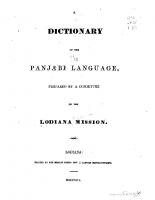English-Greek dictionary ; a vocabulary of the Attic language 9780710023247, 0710023243
294 80 81MB
English Pages [1039] Year 1910
Recommend Papers

- Author / Uploaded
- Sidney Chawner Woodhouse
File loading please wait...
Citation preview
ENGLISH-GREEK DICTIONARY
PREFACE TO THE SECOND
[SWISS]
EDITION
BOOR, particularly of course every political book, bears the imprint of the time when it was written. This is not just because the chronicle of recorded events necessarily does not extend beyond that time, and because the facts and figures reflect the state of current knowledge and are necessarily always a few months in arrears. If this were a mere chronicle of events or a reference book, these things could be rectified. But a book which tries to give a total picture must either be rewritten every year or remain unaltered, with the truth that it possessed for the time when it was written and the truth which was of somewhat longer duration. The march of events continues, and with every step both the past and future look different. Signs of new beginnings which were present fade away, infirmities heal, new forces and new combinations of old forces come into play; yesterday's hopes or anxieties may now be certainties, and promises and threats that loomed on the horizon may have vanished and passed into oblivion. It is better to admit in advance that, in spite of
EVERY
emotions such as hope and anxiety, which can never be completely impartial, played a part in building up the picture; for the latter is a product, not of an impartial electronic brain, but of someone who was emotionally involved. There can be no contemporary history without such emotional involvement. Only the light of events, which
all efforts at objectivity,
daily transform a bit of open future into the irrevocable past, can show that the picture was neither a wish phantasy nor a caricature. It is therefore important to date this book. It
was written in the spring and early summer of 1953, and
was substantially finished when the great crisis of the summer of that year threw all France's internal and external problems simultaneously into an inextricable tangle and ended in the "great indecision" of the Government of M. Laniel. While the book was still in the press it was possible to insert some summary references to the events of the autumn of that year
PREFACE. TEE ENGLISH-GBEEK LEXICON
here presented contains features acceptable both to teachers and to The vocabulary has been compiled from Attic authors of learners. the best period. So little composition is attempted nowadays outside the range of Attic that I have refrained from introducing words and Moreover, the scope of the phrases that belong to other dialects. work within the limits I set myself has attained a magnitude that would render any large increase of vocabulary a burden rather than a help to the student. The writers from whom I have selected my material are, as far as prose is concerned, THTJCTDIDES, PLATO, XENOPHON, DEMOSTHENES, and THE OBATOBS. For verse I depend upon the authority of ^SOHTLTJS, SOPHOCLES, and EURIPIDES, excluding, however, in each case, the lyrical passages. Comedy is covered
which, I
trust, will
render
it
by ARISTOPHANES. Occasionally words have been incorporated from Homer, Herodotus, and Aristotle. I have had recourse to these writers, however, pnly when I could find no equivalent in the best Attic for the word I wished to translate, and in all such cases I have indicated the source from which the word is derived. I have included in the vocabulary a few late Greek renderings of Latin words such as the names of the Roman magistracies, but have signified in each case that the word lies outside the sphere of classical Attic.
I have not drawn upon Xenophon to any large extent, because his style is unfortunately vitiated by the admission of many un- Attic elements, and is therefore not a safe guide for budding composers. In introducing phrases and sentences from the Greek I have it best to give chapter and verse for the quotations. Not thought of is the for shades context so essential delicate often defining only meaning, but the constant reference to the best models is the surest way to success in composition. It has not been intention to supply any but the bare outlines, chief aim has been to suggest of grammatical information. ideas and to help in their analysis. I have marked quantities where no indication is by position or accent, but not in the case of
my
My
gpven
words used only in prose.
,
PEEFACE
vi
Acknowledgments are due to various works of reference, among which I may single out for mention, Veitch's Greek Verbs, and, above and before all, Liddell and Scott. Mistakes in orthography and accentuation are, I fear, inevitable in a work of this size but the proofs have been carefully revised, and I can only hope that the number of errors is not large. The abbreviations should cause no difficulty. P. before a word V- before a word shows that it signifies that it has prose authority. is found in verse. A word with both P. and V. before it may as a rule be used in any species of composition. Should, however, the name of an author be placed in brackets after the words, this moans that ;
its
use
is
limited to that particular writer.
word occurs in Aristophanes, I have indicated its presence in that author by the letters Ar. before it, but in the case of words occurring frequently in both prose and verse, I have not thought it If a
A necessary to signify that they are found in Aristophanes as well. often both by Prose and by Verse writers may safely bo -employed in Comedy. It sometimes happens that a word of proao associations is found in verse, and that one commonly confined to In such a case I have put in brackets poetry is used in prose. after the word a reference to the passage in which it occnrw Thus on page 158 may be found the following word used
:
Confess.
A. 1142
&
V. trans.
P.
&
V. fydKovelv (Soph. Phil. OHO
;
Kur.
L
Frag.).
This means that the word both in Proso and ofjuokoyetv appears Verse, but its use in the latter is restricted to three passages. I have added a Supplement of Proper Names, including HOTUC of
he Greek equivalents for names famous in Koznan History, S. 0.
WOODHOUSE.
LIST OF ABBREVIATIONS Voi-b.
trans.
.
infcraus. oc.
Xen.
Verb transitive. Verb intransitive. Vocative.
Xonophon. TITLES OF ^SCHYLUB* PLAYS.
Agamemnon. Choophoroo.
Eumeuidos. Porsao.
Piomothoun Vmctus. Suppliooa.
Soptem Contra Thobas. TITLES OF ARISTOPHANES' PLAYS. Ach.
Aokarnians.
Av.
Aves.
Kquitos. Ijysistrata.
jya.
Nubos.
Nub.
Plutus. lianao.
TheHmophodassuBao. VeBpao. TlTLKS OF KlTUIWOBS Ale.
AlcontiH.
And.
Andromaohe.
Itaco.
Bacciiae.
Qyol. an.
Cyclops. Kloutra. JTocuba.
Hoc. Mural. Iiato. F
I
at.
Proposition.
Hoi. Horacl*
H.R Hipp. l.A L.T.
Mod, Boph.
Saph(
Or.
SubjimttUvtt.
Hhoon.
HUWi.
Subnt
Thuc.
'I'huc
V.
Vi*ftM*.
Helen. Hcraclidao. IIorculeH Furens.
Mippolyius. fphigonia in AuiiH. Iphigonia in TauriH. IModoa.
Wupp. Tro, vll
1
Troodett,
ABBEEVIATIONS
yiii
TITLES
off
SOPHOCLES' PLAYS.
ERRATA Page Page
56, 70,
under Await, under Beget,
Page
75,
under Besides,
v. trans., v. trans.,
u Dem 292 "
and page
prep., instead of
be deleted. under Produce,
is to
614,
P.
& V....5x
road
v. trans.,
" (gon.)
road V. Six
ADDENDUM " Page 276, between Ensue and Entail, insert Ensure,
v. trans., see
insure
11
.
(gon.)
ENGLISH-GKEEK DICTIONARY and V. abashed
u cu8/,
/Ve, Ar.audV. HOC Rrwn,
Ar.
subs.
Abase,,y.
V,
Ar.
J.
P.audV.
Iran*.
uud V.
fcrxwttWv, V,
v.
V.
HU(>B.
tmnn.
P.
TrAcfros, 5,
P.
aud V.
TaptJLxy,
^A^, ry ;
806
1'*
anhanwl
:
v.
trans.
Encourage: P. and
^TrtK^Aeuct^, Trapa/coAeti/, op/Aav,
V.
, J/cr fatlwr Meitfr V, vrve(i/. abets his dowjhtar herein : V. (Ear,, /ld, 40), Abettor, nubn, Sco acMMtory, hdper. P. Abeyance, leave in, v. trans.
also P. uid V- HtpimtrOat, (Plat.).
Abasement,
and P. ^
;
Abet, subs. P. P. and V.
;
and V.
mad-mas.
Abandonment, Betrayal
P.
(gen,).
see belly. Abduction, aubs, P. and V. or pi, V. aywyij, 7; (-flSHoh., Ag.
or
L%
v.
Abdicate,
and V. tyrj/w. 'lietrayed : Bane (of character) V. 7zy>o'8oros. 1203). -*--'* P. and V. *&>$, aJcrxpos, V. Aberration, subs. ;
?/
(Plat.).
TO
V.
Abandoned,
uid V. >, Ably, adv. Cleverly : P, and V jMw Abreast, adv. In a Zme : P. and V. .
From
above
:
&7roppu>
P.
^Kpt5
&&&
;
^
^a,
{Superior to : uso P, and V, (go.u.), V. ftrcpTpo? (gen.), Aei/i3
bribed
:
P. xp/fw*TW|/ : r, tiAirpo/ T a Forgetful : Ar. and P. polo*. see and P. ar/Ao(i'. //









![A Concise Etymological Dictionary of the English Language [1.0]](https://ebin.pub/img/200x200/a-concise-etymological-dictionary-of-the-english-language-10.jpg)